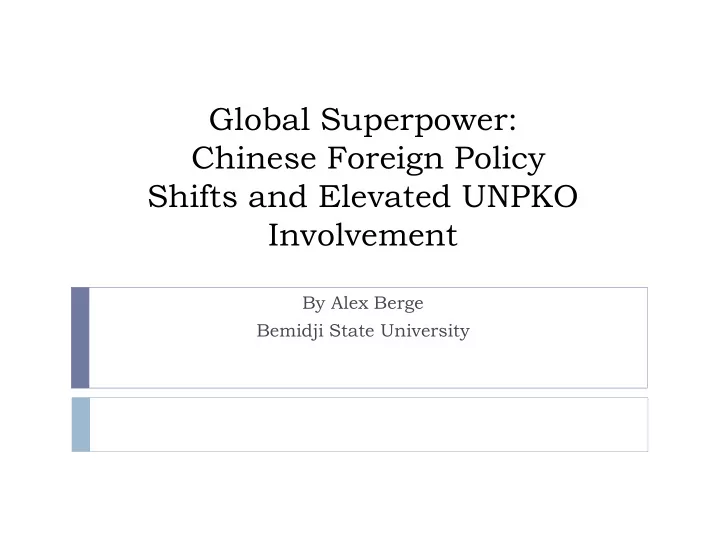

Global Superpower: Chinese Foreign Policy Shifts and Elevated UNPKO Involvement By Alex Berge Bemidji State University
Importance Eastin Points to a current decline in U.S. hegemony to consider the possibility of emerging powers gaining hegemonic status Eastin, L. J. (2013). Legitimacy Deficit: Chinese Leadership at the United Nations. Chinese Journal of Political Science , 389-402.
Hegemonic Status Is achieved by a state who has the ability to coerce smaller states to cooperate and support it in its leadership This also includes a degree of consent among cooperating or subordinate states Obtaining legitimacy is a key component
Legitimacy Military victory in a hegemonic war Production of certain global public goods Ideology, religious, or value acceptance among a set of states
Methods of Delegitimation Delegitimizing the current global hegemon’s international authority and power. Putting forth competing values into global system 1) Cost-imposing strategies 2) Forming a competing ideology 3) Accept the current hegemon and then undermine them 4)
Eastin’s Conclusion China is still emerging Regional Power Increasing contributions UNPKO involvement- does it affect legitimacy?
Chinese Foreign Policy Shifts 1946- 1980 abstentions and involvement Questions of ideology 1982 reform era: rise of pragmatism
UNPKO Involvement Stockholm International Peace Research Institute (SIPRI)
Chinese Regional Influences Africa and Asia UNPKO Shanghai Cooperation Organization ASEAN CHINESE INVOLVEMENT BY REGION All U.N. Chinese Involvement 239 159 95 70 54 47 29 20 16 10 9 7 A F RIC A A ME RIC A S E A S T A S IA A ND C E NT RA L A ND E UROP E MIDDLE E A S T P AC IFIC SOUT H ASIA
African Land Deals China Activity in Africa • DRC: 7 million acres for biofuels Tanzania: 741 • acres secured for rice • Zambia: 4.9 million acres for biofuels
Conclusions UNPKO Regional Issues Reactionary stance Does help legitimacy claims
Recommend
More recommend